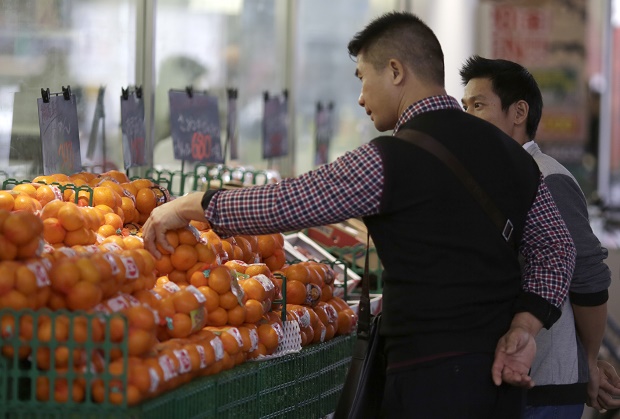Japan’s jobless rate at 20-year low, consumer spending drops

In this Nov. 17, 2015 photo, shoppers take a look at orange on sale at a shop at a shopping street of Ginza area in Tokyo. Japan’s jobless rate fell to a 20-year low in October, but consumer spending and incomes also edged lower as the tight labor market failed to spur significant increases in wages. The government reported Friday, Nov. 27, 2015 that unemployment in the world’s No. 3 economy dipped to 3.1 percent in October, compared with a rate of 3.4 percent in September. AP
TOKYO — Japan’s jobless rate fell to a 20-year low in October, but consumer spending and incomes also edged down as the tight labor market failed to spur significant increases in wages.
The latest figures are likely to help Prime Minister Shinzo Abe’s effort to cajole companies into offering higher wages, to accelerate inflation by raising consumer demand through higher incomes.
So far, short-handed employers have resorted to use of overtime and hiring more temporary workers, seeking to avoid increases in base wages that would be difficult to reverse if the economy takes a turn for the worse.
The government reported Friday that unemployment in the world’s No. 3 economy dipped to 3.1 percent in October, compared with 3.4 percent in September. It was the lowest level since July 1995.
Consumer spending, meanwhile, fell 2.4 percent from the same month a year earlier, and average incomes fell 0.9 percent.
Article continues after this advertisementJapan’s inflation rate also was lower in October, with core inflation excluding volatile food prices down 0.1 percent for the third month in a row.
Article continues after this advertisementThe success of the government’s “Abenomics” policies hinges on getting consumers and companies spend to more. Abe has also launched social welfare initiatives aimed at easing the burden of child care and elder care to help encourage more women to work.
This week, Abe appealed to business leaders to offer bigger wage increases during next year’s spring “shunto,” or “labor offensive,” when unions and companies hash out pay agreements for the year.
Abe has pledged to slash corporate taxes in exchange for progress on wages. The government also intends to raise the minimum wage, which is now at a modest 798 yen ($6.50) an hour on average, by 3 percent a year, aiming to get it up to 1,000 yen ($8.15) an hour by 2020.
Big companies, reaping record profits thanks to strong export earnings, can afford that.
However, most people paid the minimum wage work for small and medium-size companies that cannot afford to pay more, said economist Masamichi Adachi of JPMorgan.
“Those small tiny firms, which are always losing money and don’t pay taxes, are not making money at all. If they have to raise wages their losses will grow and they will find it hard to survive,” he said.
RELATED STORIES
Asian shares lower on jitters over strife in Middle East